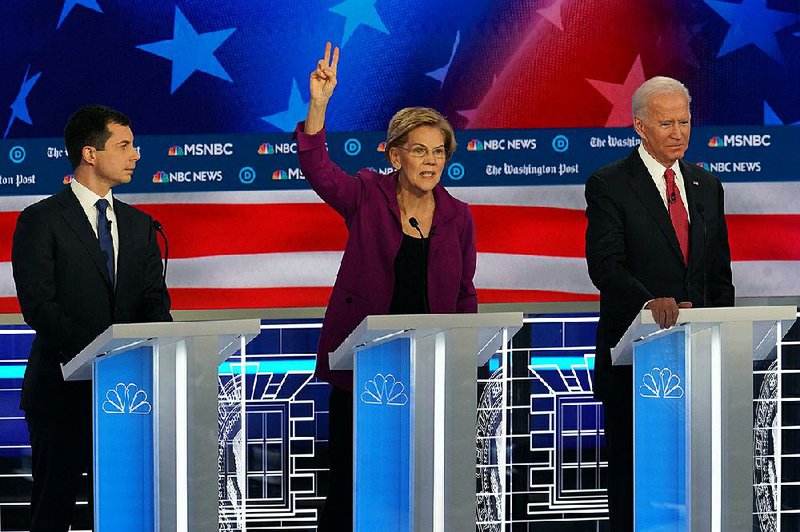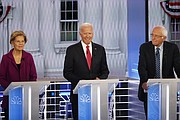ATLANTA -- The top Democratic presidential candidates gathered Wednesday for their latest debate, once again revealing their differences over the idea of "Medicare for All."
As in a string of previous debates, Wednesday's featured disputes over a proposal for fully government-run, universal health care that would be difficult to get through Congress -- even if Democrats take the White House and make significant 2020 congressional gains.
Sens. Elizabeth Warren of Massachusetts and Bernie Sanders of Vermont, the race's strongest progressive voices, staunchly defended Medicare for All.
"The American people understand that the current health care system is not only cruel, it is dysfunctional," Sanders said.
Former Vice President Joe Biden said many people are happy with private insurance through their jobs, while Mayor Pete Buttigieg of South Bend, Ind., complained about others taking "the divisive step" of ordering people onto universal health care, "whether they like it or not."
[Video not showing up above? Click here to watch » https://www.youtube.com/embed/hRtcLjmBwB0]
The candidates expressed uniform support for the impeachment inquiry into President Donald Trump's conduct toward Ukraine, but they signaled reservations about the possibility that the 2020 campaign could become submerged in a congressional investigation of Trump's behavior.
"We cannot simply be consumed by Donald Trump because if we are, you know what? We're going to lose the election," Sanders said, pointing to social problems such as homelessness and climate change, which he termed "the great existential crisis of our time."
The seeds of a larger debate over policy and political strategy became evident even in the candidates' answers targeting Trump. Sanders and Warren railed against corruption in Washington, while other candidates, including Buttigieg and Biden, emphasized the importance of forging political unity and electing Democratic senators from red states.
Biden, who has staked his campaign on the perception that he is a strong general election candidate, used his leadoff answer to urge Democratic voters to pick a nominee who can "go into states like Georgia and North Carolina and other places and get a Senate majority."
The debate came at a critical juncture for the Democratic Party -- less than three months before the first voting contests and with big questions hanging over the front-runners.
Some Democrats have grown worried about Biden's durability, while others fear that Warren and Sanders are too liberal to win a general election. Those concerns have prompted former Massachusetts Gov. Deval Patrick to launch a late bid for the nomination, with former New York City Mayor Michael Bloomberg weighing whether to jump in as well in the coming days.
Buttigieg, who is rising rapidly in the polls in Iowa, found himself for the first time in the position of defending his qualifications for the presidency, given that he has never held a state or national office. Buttigieg was asked early in the debate about how being mayor of a city of 100,000 residents qualified him for the White House, and he said he was more than up to the challenge.
"I know that from the perspective of Washington, what goes on in my city might look small," Buttigieg said. "But frankly, where we live, the infighting on Capitol Hill is what looks small."
Sen. Amy Klobuchar of Minnesota pivoted from her past criticism of Buttigieg, whom she has described as benefiting in the race from being male, and instead issued a forceful plea to the country to elect a female president.
"Women are held to a higher standard, otherwise we could play a game called name your favorite woman president," Klobuchar said.
"If you think a woman can't beat Donald Trump, Nancy Pelosi does it every single day," she added.
In the moderators' chairs were four women, including Rachel Maddow from MSNBC and Ashley Parker, a White House reporter for The Washington Post. It marked only the third time a primary debate has been hosted by an all-female panel.
A clash broke out early between two candidates with relatively low polling numbers who were looking for big moments: Sen. Kamala Harris of California and Rep. Tulsi Gabbard of Hawaii, who has criticized prominent Democrats including 2016 presidential nominee Hillary Clinton.
"I think that it's unfortunate that we have someone on the stage who is attempting to be the Democratic nominee for the president of the United States who during the Obama administration spent four years full time on Fox News criticizing President Obama," Harris said of Gabbard.
"I'm not going to put party interests first," Gabbard responded.
But the discussion kept finding its way back to Medicare for All, which has dominated the primary race.
Warren has released plans to raise more than $20 trillion in government revenue for universal health care. But she also said implementation of the program may take three years -- drawing criticism both from moderates like Biden and Buttigieg, who say she's trying to distance herself from an unpopular idea, and Sanders supporters who believe that Warren's commitment to Medicare for All is wavering.
Sanders made a point of saying Wednesday that if he were elected, he'd send Medicare for All to Congress during the first week of his administration.
Sen. Cory Booker of New Jersey faced especially intense pressure since he has yet to meet the Democratic National Committee's polling requirements for the December debate in California. He spent several minutes arguing with Warren about the need to more appropriately tax the wealthy, but he also called for "building wealth" among members of minority groups and other marginalized communities.
"We've got to start empowering people," Booker said.
Information for this article was contributed by Bill Barrow, Will Weissert and Jill Colvin of The Associated Press and by Alexander Burns and Jonathan Martin of The New York Times.
A Section on 11/21/2019


